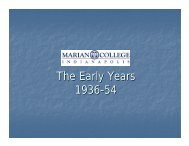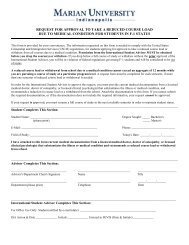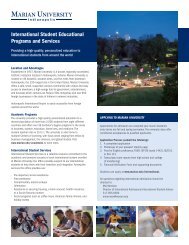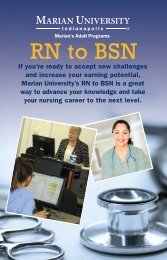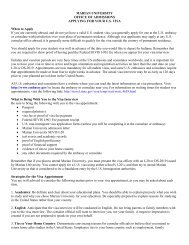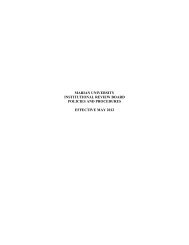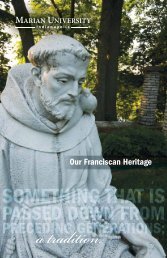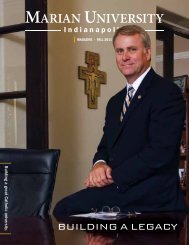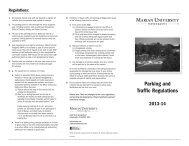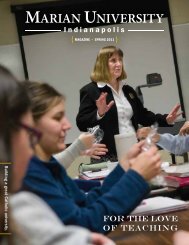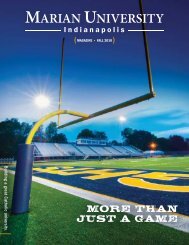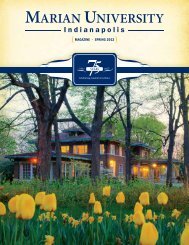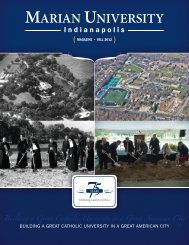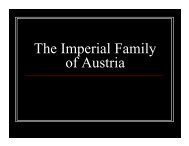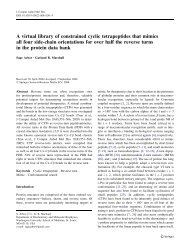2009-11 Marian University Course Catalog, fall 2010 edition
2009-11 Marian University Course Catalog, fall 2010 edition
2009-11 Marian University Course Catalog, fall 2010 edition
Create successful ePaper yourself
Turn your PDF publications into a flip-book with our unique Google optimized e-Paper software.
Academic Services<br />
Academic Advising<br />
Academic advising is available through each school and the<br />
Office of Academic Affairs.<br />
New students, full and part-time, are assigned to an academic<br />
advisor by the Office of the Registrar. Assignments are made<br />
according to the student’s declared major. Exploratory<br />
students are assigned to a faculty member who assists them<br />
in exploring options and planning their general education<br />
base. Non-degree students may be assisted by the registrar<br />
when the student is not part of a regular program.<br />
After initial schedule planning, the student continues to<br />
consult with the academic advisor about program changes,<br />
educational goals, and general progress. The most important<br />
reference tool for academic advising is the current <strong>edition</strong> of<br />
the <strong>Marian</strong> <strong>University</strong> <strong>Course</strong> <strong>Catalog</strong>.<br />
If a student needs to change a major or request a different<br />
academic advisor, a Change of Major/Advisor form can be<br />
obtained from the Office of the Registrar. After obtaining all<br />
the necessary signatures, the form must be returned to the<br />
Office of the Registrar for recording.<br />
Computing Facilities<br />
The university provides computing access in different areas of<br />
the campus depending on the needs of the students. The<br />
hours available for computing access will vary by area.<br />
Wireless access to the local area network and the Internet is<br />
available in all residential units, the library, the student<br />
center, and all academic areas.<br />
All computers in the two campus-wide labs, the library open<br />
computing and discipline-specific<br />
labs include word processing, spreadsheet, presentation, email,<br />
and Internet-access applications. Discipline-specific labs<br />
will have added software applications; for example, graphic<br />
design and tutorial software.<br />
Student lab assistants from the Department of Instructional<br />
Technology are available on the first floor of the library to<br />
answer questions, assist with problems, and provide informal<br />
and scheduled formal basic training on how to use the<br />
available software. Discipline-specific computing labs include<br />
biology, chemistry, education, languages, nursing, performing<br />
arts, and visual arts. Some labs also have student assistants<br />
available to answer questions regarding academic software<br />
applications installed in the lab.<br />
Two computer classrooms are available for open computing:<br />
<strong>Marian</strong> Hall 304 Computer Center and Library 008 located in<br />
the library’s lower level. These classrooms support both<br />
formal class use as well as open computing access by<br />
students, faculty, and staff during non-class times. A<br />
published schedule of class times and open computing times<br />
are posted in the hall immediately outside of each lab.<br />
Adjacent to <strong>Marian</strong> Hall 304, the computer classroom is an<br />
open lab that is available Monday through Friday, during<br />
daytime hours; please see the posted hours outside the lab.<br />
Library 008 and library open computers are only available<br />
during library hours.<br />
Students can access their e-mail through the web at<br />
https://webmail.marian.edu. Access to their CAMS portal is<br />
accessed at http://camsap.marian.edu/estudent. Both CAMS<br />
and e-mail accounts are available to all <strong>Marian</strong> <strong>University</strong><br />
students. New students are issued their new accounts as they<br />
enroll. If you have forgotten your account information or your<br />
account is not working, please request assistance by visiting<br />
the Department of Technology located in <strong>Marian</strong> Hall 315.<br />
Language Center<br />
The Christel DeHaan Language Center, located in <strong>Marian</strong> Hall<br />
207, provides electronic and media support for the study of<br />
languages. Student stations are equipped with technology to<br />
facilitate the study of French, German, and Spanish.<br />
Computer stations offer possibilities for practice and skillbuilding<br />
in vocabulary, language structure, reading,<br />
composition, and review of historical and cultural<br />
information. Access to the Internet broadens the scope of<br />
resources and information available to the student. The<br />
center serves as a classroom as well as an electronic library<br />
for individual study.<br />
Learning and Counseling Center<br />
The Learning and Counseling Center (LCC) is a resource center<br />
for the <strong>Marian</strong> <strong>University</strong> community. The staff of the LCC<br />
provides academic support services, personal counseling, and<br />
consultation to all students. Services are provided at no<br />
charge to currently enrolled students. Consultation services<br />
are also provided to faculty and staff.<br />
Assessment and Screening:<br />
Individual assessments are available to screen for learning<br />
difficulties, attention deficit issues, learning style, substance<br />
abuse, depression, anxiety, or eating disorders.<br />
Reading and Learning Strategies <strong>Course</strong>:<br />
COL 099, a three-credit course is offered each semester with<br />
an emphasis on learning strategies, study skills, textbook<br />
reading skills, and vocabulary development.<br />
Crisis Intervention:<br />
During normal daytime office hours, the director of<br />
counseling and the LCC staff are available to provide crisis<br />
intervention services to all students. Resident students<br />
needing emergency mental health services during the<br />
evening or weekends are directed to contact their residence<br />
hall director or the Campus Police at 317.955.6789. Nonresident<br />
students should call the local crisis intervention<br />
number at 317.251.7575 or 9<strong>11</strong>.<br />
Personal Counseling:<br />
37



